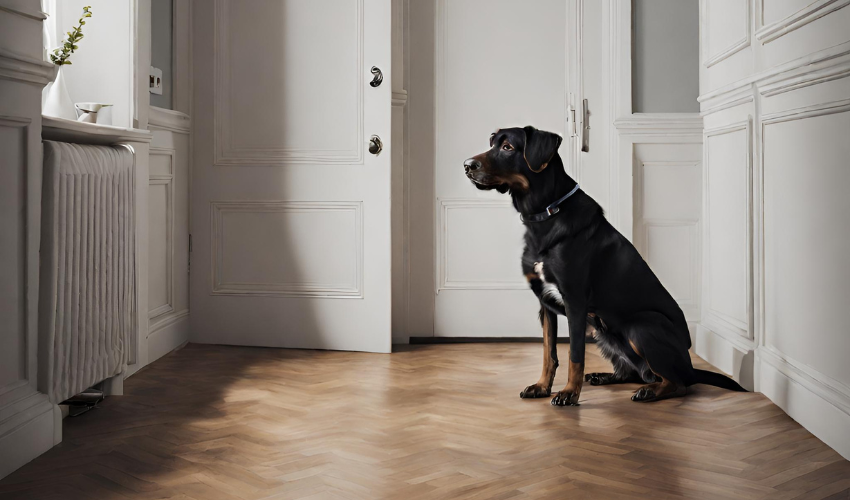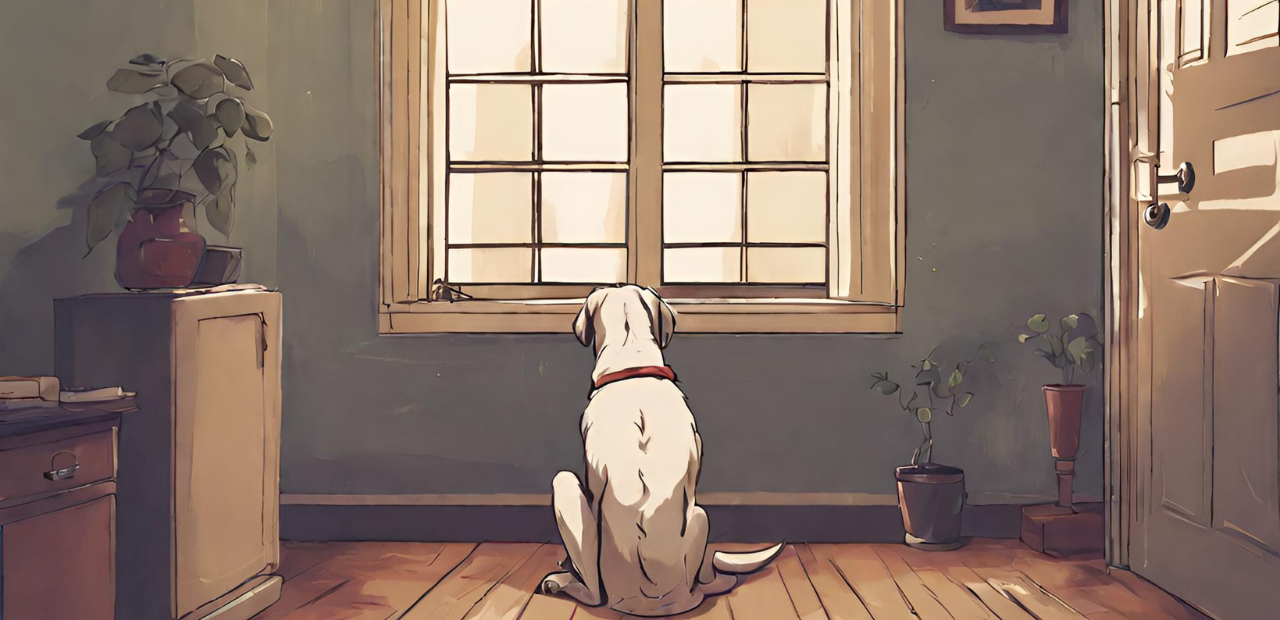Have you ever wondered why your furry companion sometimes chooses to sit alone in another room? It can be confusing and even concerning. In this article, we will explore five possible reasons why dogs exhibit this behavior. Understanding why your dog does this can provide valuable insights into their emotional wellbeing and help strengthen your bond. So let’s dive in and unravel the mystery behind your dog’s solitary moments.
Seeking Solitude
Just like humans, dogs also need time for themselves. Solitude can be a way for them to recharge, especially if they’re feeling overwhelmed. As we unravel this further, we’ll look at how their natural instincts and reactions to stress might be driving them to seek out alone time.
Natural Instincts
Dogs are descendants of wolves, wild creatures that value alone time and space as much as pack camaraderie. Nowadays, even though dogs have been domesticated, this ancestral predisposition still lingers in their behavior. When your dog retreats to another room, it might just be their natural instinct kicking in. They might seek out quiet corners to rest and recharge, just as their ancestors did in the wild.
It’s important to understand that alone time is often quite beneficial for dogs. It helps them manage their energy levels and maintain a balanced state of mind. So, don’t worry if you find your dog sitting alone in another room periodically, they are likely just enjoying some solitary relaxation.
Reacting to Stress
Even the most outgoing of dogs can have moments of stress. This can cause them to retreat and sit alone in another room. It’s an attempt to find a quiet place where they can calm themselves.
The source of stress can be a variety of stimuli. It could be the loud noises from a thunderstorm or the arrival of unfamiliar guests. If you notice this behavior during stressful situations, it’s best to give your dog the space they need. Trying to coax them out might add more stress.

Personal Space
Personal space is not just a human concept; our canine friends value it too. Just like us, they might retreat to a solitary spot to enjoy some peace and quiet. This might be why you find your companion in another room by themselves. In this section, we will examine how dogs establish their boundaries and why they sometimes seek to avoid overstimulation.
Establishing Boundaries
Just like humans, dogs need their own personal space sometimes. They set boundaries to have some privacy or simply take a break from all the fuss. This behavior is normal and healthy, indicating that your dog is well-adjusted and confident. They understand that they have a safe space where they can retreat to when they want some alone time.
Remember, it’s essential to respect these boundaries and not invade their space during these times. It allows them to feel secure and in control of their environment. It’s their way of saying, “I need some time to myself right now, and I know I can get it without any hassle.” This ability to establish and regulate their personal space contributes to their overall emotional wellbeing.
In some instances, if your dog is consistently seeking isolation, it might be a good idea to consult with a vet or professional dog behaviorist. They can help determine if this behavior is a healthy expression of boundaries or a symptom of a bigger issue.
Avoiding Overstimulation
Dogs, just like humans, need some downtime now and then. Think about it — our lives are filled with all kinds of stimuli, and for our furry friends it’s no different. From the neighbor’s loud lawnmower to the kids’ chaotic games, it can sometimes become a bit too much for them.
Deciding to enjoy some peace in the quiet of another room becomes their way of managing the sensory overload. It acts as a relaxing break from the hustle and bustle of daily life. It’s their version of ‘me-time’. And, as pet owners, it’s essential for us to respect this need for tranquil moments and let them have their much-needed solitary time.
Uncomfortable Environment
You know your home is comfy and cozy. After all, you’ve designed it with your comfort in mind. But have you considered if it’s comfortable for your dog too? There might be aspects of your home environment that are making your pooch uncomfortable which is why they might opt to spend time alone in another room. Let’s delve into some of these factors.
Temperature or Noise
Does your dog have a favorite room in the house they always retreat to? This could be because of temperature or noise. Dogs can be sensitive to their environment and might seek the quietest or most comfortable spot in the house.
They are known to favor cooler spots if they feel overheated or are covered with a heavy coat of fur. Alternatively, they may search for warmth in colder months. As for noise, a room that’s quieter can provide them with a sense of calm. Loud noises like a playing television, a running washing machine, or your kids screaming in the other room, might drive them to seek solitude. Your dog’s retreat to another room could be less about isolation and more about finding peace and comfort. Remember, every pooch is unique, and what applies to one might not apply to another.
Smells or Sensitivities
Dogs have an impressive sense of smell, much more robust than ours. They can detect odors in parts per trillion. This ability can sometimes be a curse, especially if their environment is filled with intense or unpleasant odors. It might make them find refuge in another room to escape these smells.
Additionally, dogs may also be sensitive to specific substances. Household cleaning products, air fresheners, or even a new fabric softener can bother your dog. If you notice your dog moving to another room after you’ve used a particular product, it may be the cause. Be mindful of these factors and try to reduce any intense smells in their living area. This might help them feel more comfortable staying around.
Remember, a dog’s nose knows! By understanding and respecting their smell sensitivity, we can ensure their environment feels safe and satisfying.
Health Concerns
One possible explanation for your canine companion’s solo sessions could be related to health concerns. Just as humans seek peace and quiet when not feeling well, dogs might isolate themselves if they’re experiencing discomfort. There’s also a chance they could be dealing with mental or emotional health issues. Let’s take a closer look at these concerns.
Physical Discomfort
Sometimes your dog might be experiencing physical discomfort. Pain, sickness, or injuries can make your dog want to be alone. This discomfort may make them see social interactions as overwhelming, causing them to retreat to a quieter space.
For example, if your dog has arthritis, which is quite common in older dogs, they might choose to sit alone in a cool and quiet room to rest their aching joints. It’s crucial to observe the physical signs such as a decrease in appetite or limping. It is recommended to consult with your vet if you notice any unusual behavior.
The same can go for minor discomfort like an upset stomach or a small scrape. Your pet will naturally find comfort in being alone while dealing with these minor predicaments.
In this scenario, your dog’s solitary behavior is their attempt to cope with their physical discomfort.
Mental or Emotional Health Issues
Just like humans, dogs can experience emotional issues too. When dogs are feeling low or anxious, they may prefer to be alone and could seek solace in a quiet room. It’s their way of dealing with overwhelming emotions. Sometimes, these issues can stem from age-related conditions such as canine cognitive dysfunction, which is similar to Alzheimer’s in humans.
Seeing your beloved pet isolating themselves can be distressing. However, understanding their emotional health is key to help them through tough times. A changed behaviour like this could also be a sign that it might be time to consult with a vet or an animal behaviorist. They can provide professional guidance and treatment options which may include therapy or medications.
“Understanding Canine Cognitive Dysfunction” (https://vcahospitals.com/know-your-pet/cognitive-dysfunction-in-dogs)
Past Experiences
Your precious pup’s past can have a profound effect on their present behavior. Let’s delve into how past experiences like negative associations or behavioral conditioning could be leading your dog to spend solo time in another room.
Negative Associations
There are instances where your dog might hold negative associations with certain areas or people in the house. Remember, dogs have a good memory and their past experiences can shape their behavior significantly. Just like humans, dogs can associate certain rooms or situations with negative experiences, and hence, they might choose to sit alone in another room to avoid those situations.
For example, if a room is where they’ve experienced something scary, like a vacuum cleaner or a loud noise, they might retreat to another room for comfort. Understanding these negative associations is the first step towards addressing your dog’s fear and helping them feel more secure.
Behavioral Conditioning
Sometimes dogs may isolate themselves due to behavioral conditioning. This happens when a dog has learned through past experiences that certain actions result in specific outcomes.
Let’s say there was a point in time when your dog was constantly scolded for being too noisy in the living room. In an effort to avoid the scolding, your dog might now prefer to stay alone in another room. This is a learned response from past experiences.
In cases like these, re-conditioning can help your dog feel more comfortable. It involves creating positive associations with being in the same room as you. Rewarding your dog with treats or affection can help them unlearn their conditioned response. Such actions can encourage your dog to share more time with you.
”Behavioral conditioning can result in a dog isolating themselves. Creating positive associations with shared spaces can help counteract this.”
Conclusion
In conclusion, there can be various reasons why your dog chooses to sit alone in another room. It could be a natural instinct to seek solitude or a way to establish personal space. Uncomfortable environments, health concerns, and past experiences can also play a role. By paying attention to your dog’s behavior and addressing any potential issues, you can create a safe and comfortable environment for them. Remember, a happy and content dog makes for a happier and healthier companion.
- Smelly House Because of Dog? Take These Hygiene Tips - May 20, 2025
- How to Introduce a Dog To a Cats Without Chaos - May 6, 2025
- 4 Best Cavapoo Rescues in the UK 2024 - April 5, 2024








